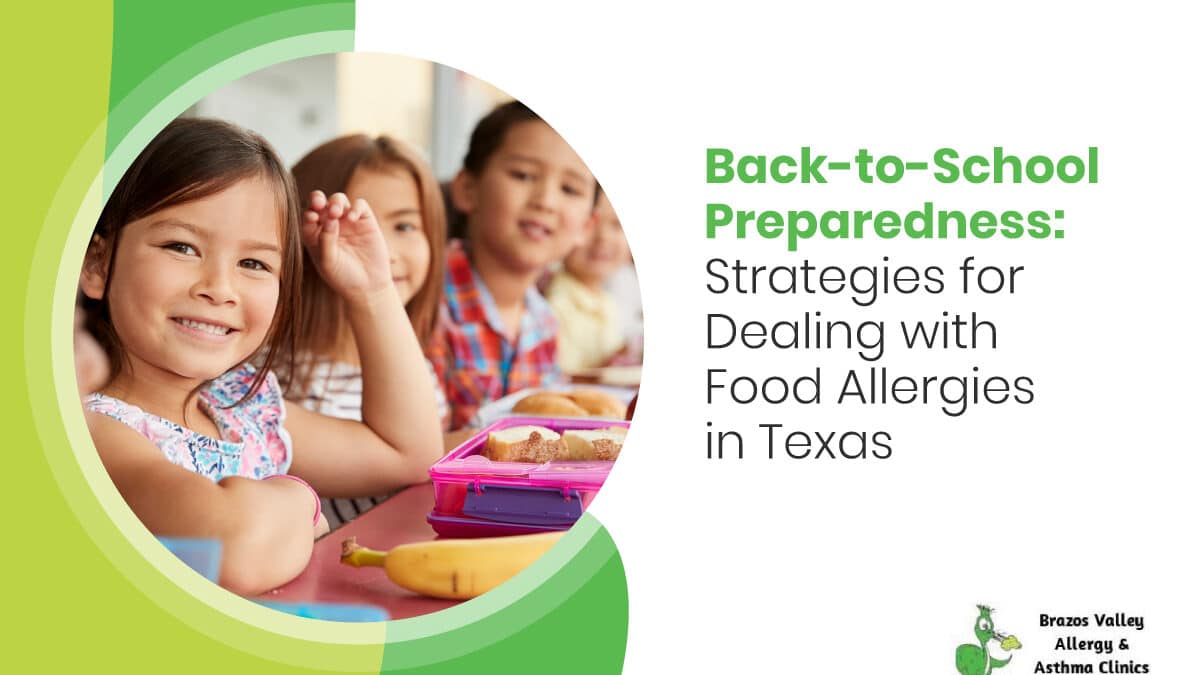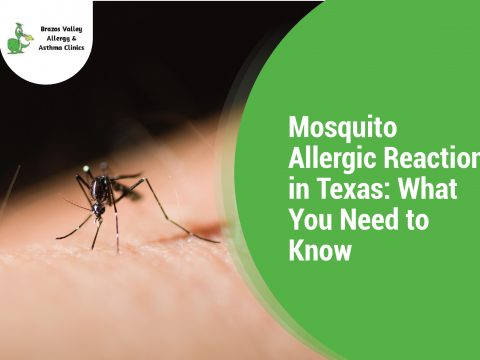- 979-485-9287
- office@bvallergy.com
-
 979-251-7804
979-251-7804
Back-to-School Preparedness: Strategies for Dealing with Food Allergies in Texas

Air Quality and Asthma: Managing Triggers During Summer Heatwaves
July 10, 2023
Preventing Outdoor Allergies: Tips for Enjoying the Outdoors
August 18, 2023Food allergies can be a significant concern, especially regarding the safety and well-being of children in a school setting. As students prepare to return to school in Texas, parents, teachers, and school staff must be well-informed about food allergy management.
Food allergies affect millions of children in the United States, and their prevalence is rising. The Centers for Disease Control and Prevention stated that approximately 8% of children in the United States suffer from the condition. These allergies can cause severe reactions, including anaphylaxis, a life-threatening condition.
This article aims to provide strategies and guidelines on how to manage food allergies in Texas schools. Implementing these measures can ensure a safe and inclusive environment for all students.
Understanding Food Allergies
Food allergies occur when your body’s natural defense system mistakenly identifies specific proteins in food as harmful substances. Common food allergens include:
When a student with a food allergy accidentally consumes an allergen, it can trigger an allergic reaction ranging from mild to severe and potentially life-threatening.
Preparing for the School Year: Food Allergy Management Tips
Parents and guardians of children with food allergies must take certain precautions to ensure a smooth transition into the new school year.
Here are some essential steps for effective food allergy management:
Develop an Allergy Action Plan
An allergy action plan outlines specific instructions for managing a child’s food allergy. It should include emergency contact information, a list of allergens, signs of an allergic reaction, and steps to follow in case of exposure.
Prepare Medical Documentation and Medications
Parents must provide the school with up-to-date medical documentation, such as a doctor’s diagnosis and any necessary prescriptions. If the child requires medication, it should be labeled correctly and stored in a secure location accessible to the student and designated staff members.
Ensure Safe Lunch and Snack Practices
Pack safe and allergen-free lunches and snacks for your child, ensuring they are appropriately labeled. Educate your child about their food allergies and the importance of not sharing food with others.
Collaborate with School Staff
Effective collaboration between parents, teachers, and school staff is crucial for managing food allergies successfully. Communication is essential to ensure everyone understands the specific needs of the allergic student and the necessary precautions.
Food Allergy Management in the Classroom
Managing food allergies in the classroom requires the cooperation of teachers and classmates.
Here are some essential guidelines:
Educate Classmates and Teachers
Teachers should educate the class about food allergies, their potential dangers, and the importance of avoiding allergens. Classmates should be encouraged to be mindful of the allergic student’s needs and promptly report any incidents or allergic reactions.
Establish Classroom Policies
Establishing classroom policies can help minimize the risk of allergen exposure. Consider implementing guidelines such as a “no food-sharing” policy, regularly cleaning shared surfaces, and using hypoallergenic art supplies.
Emergency Preparedness
Despite careful planning, allergic reactions can still occur. Preparation is the key to emergency situations.
Train the School Staff in Emergency Procedures
School staff should receive proper training in recognizing symptoms of an allergy attack and administering emergency medications, such as epinephrine auto-injectors.
Establish an Emergency Response Protocol
Establish a clear emergency response protocol that outlines the necessary steps in case of an allergic reaction. This protocol should include notifying parents or guardians, contacting emergency services, and providing appropriate medical care.
Encouraging Open Communication
Maintaining open lines of communication between parents, teachers, and school staff is vital for effective food allergy management:
Encourage Parent-Teacher Meetings
Regular meetings between parents and teachers allow one to discuss the child’s needs, address concerns, and develop appropriate strategies.
Participate in Parent Support Groups
Encourage parents to participate in support groups or online communities to share experiences, exchange information, and seek guidance from others facing similar challenges.
Engaging Parents and Guardians
Parents and guardians are crucial in managing their child’s food allergies. Here are some ways to engage and involve them:
Organize Parent Education Sessions
Organize educational sessions for parents to learn about food allergies, emergency response procedures, and strategies for managing allergies at home.
Promote Regular Updates and Communication
Keep parents informed about any changes or updates regarding food allergy management in the school. Regularly communicate with them to address concerns and provide feedback on their child’s well-being.
Promoting Awareness and Inclusion
Raising awareness about food allergies helps create a supportive and inclusive environment for all students:
Promote School-Wide Education
Promote school-wide education programs or awareness campaigns to foster understanding and empathy among students, teachers, and staff.
Help Organize Allergy Awareness Events
To promote inclusivity and accommodate students with food allergies, help organize allergy awareness events, such as food-free celebrations or fundraisers.
Food Allergy Treatment Options
Unfortunately, food allergies are incurable. However, various food allergy treatment options can help manage allergic reactions. Below are some examples.
Epinephrine Auto-Injectors
The American College of Allergy, Asthma, and Immunology says that Epinephrine auto-injectors, known as EpiPens, are the first-line treatment for severe allergic reactions. Ensure trained staff members have access to these devices and are familiar with their use.
Allergy Medications
Antihistamines and other allergy medications may help alleviate mild allergy symptoms. However, they do not provide sufficient protection against severe reactions and should not replace the use of epinephrine in emergencies.
From Allergic Reactions to A+ Actions: Texas’ Guide to School Food Safety
As students in Texas head back to school, it is crucial to prioritize food allergy management. By implementing the strategies and guidelines outlined in this article, we can create a safe and inclusive environment for all students, ensuring their well-being and academic success.
FAQs
Q1: What is a food allergy?
Allergic reaction to food is an adverse health condition where your immune system negatively reacts to harmless proteins.
Q2: How can schools prepare for managing food allergies?
Schools can prepare for managing food allergies by implementing allergy action plans, collaborating with staff, educating classmates and teachers, and implementing emergency response protocols.
Q3: How should parents ensure their child’s safety at school?
Parents should develop an allergy action plan, provide necessary medical documentation and medication, and communicate regularly with school staff about their child’s needs.
Make Your Child’s Back-to-School Journey Allergy-Free!
To make your child’s back-to-school journey safe from allergies, consult Dr. Jantzi – our board-certified allergist and immunologist in the Brazos Valley area. If you’re searching for “food allergies and school, food allergies Texas, or Tex food allergy,” you’re on the right page!
He provides safe and efficient treatment options for food-related allergies using evidence-based methods. He cares for all his patients with allergies, asthma, and immune system illnesses.
Book an appointment by clicking this link.




